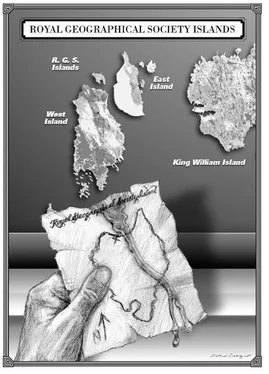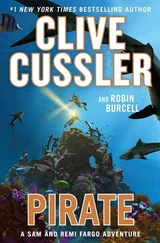The President quietly strolled over to the east window and gazed out at the Rose Garden. “I suppose there is no walking away. But there is also no need to fan the flames of distrust. Let’s voluntarily abide by the ban for ninety days. I want no American-flagged vessels, including submarines, even to encroach on Canadian Arctic waters during that period. That should give everyone time to cool their heels. Then I’ll have State work up a meeting with Prime Minister Barrett, and we’ll try to reintroduce some sanity back into the equation.”
“An excellent suggestion,” Meade demurred. “I’ll put a call in to the Secretary of State right away.”
“Mr. President, there is one other thing,” the Secretary of Defense stated. “I’d like to war-plan a few counterstrike scenarios, should events dictate.”
“Good God,” the President thundered. “We’re talking about Canada here.”
The room fell silent while Garner glared at the Secretary of Defense. “Do what you have to do. If I know you, you probably already have a full-blown invasion plan all worked out.”
The Secretary of Defense sat stone-faced, unwilling to deny the President’s accusation.
“Seems to me we should be focusing our resources on investigating who’s roughing up the Canadians and why,” injected Sandecker. “What exactly do we know about the two incidents in question?”
“Very little, I’m afraid, since they both occurred in remote areas,” replied Moss. “The first incident involved a commercial vessel flying the American flag that rammed a Canadian Coast Guard cutter. All we know from the Canadians is that the vessel was a small containership carrying the name Atlanta . The Canadians thought they would nab her farther into the passage, near Somerset Island, but the ship never materialized. They believe she may have sunk, but our analysts believe it is possible she could have backtracked to the Atlantic without being seen. The marine registries show a dozen ships named Atlanta , although only one is of comparable size and configuration. It is sitting in a dry dock in Mobile, Alabama, where it has been parked for the last three weeks.”
“Perhaps the Canadians were right, and she sank from her own damage caused by the ramming incident,” the President said. “Otherwise, we have to assume it’s a case of mistaken identity.”
“Odd that they would aim to run the passage and then disappear,” Sandecker noted. “What about the Beaufort Sea ice camp? I’ve been told that we had no vessels anywhere near the area.”
“That is correct,” Moss replied. “All three of the ice camp survivors claim they saw a gray warship flying American colors burst through the camp. One of the men identified the ship as carrying the number 54. As it happens, FFG-54 is currently on station in the Beaufort Sea.”
“One of our frigates?”
“Yes, the Ford , out of Everett, Washington. She was supporting a submarine exercise off Point Barrow at the time of the incident, but that was over three hundred miles away. Aside from that, the Ford is not ice-rated, so she would have had no business plowing through the thick sea ice that supported the camp.”
“Another case of mistaken identity?” the President asked.
“Nobody knows for sure. There’s just not much in the way of traffic in that area, and there was a heavy storm at the time that obscured things.”
“What about satellite imagery?” Sandecker asked.
Moss flipped through a folder, then pulled out a report.
“Satellite coverage in that region is pretty sporadic, for obvious reasons. Unfortunately, we don’t have any imagery available within twelve hours of the incident.”
“Do we know for sure it wasn’t the Ford ? Could they have made a mistake?” the President probed.
“No, sir,” the Secretary of Defense replied. “I had Pacific Command review their navigation records. The Ford never traveled anywhere near the position of the ice camp.”
“And we’ve shared that information with the Canadians?”
“The Chief of the Defence Staff has seen the data and concurs off the record that the Ford was likely not responsible,” replied the Secretary of Defense. “But the politicians don’t trust what we are giving them, quite frankly. Given the mileage they have gotten out of the incident, they have no reason to backtrack now.”
“Find those ships and we find our way out of this mess,” the President stated.
His advisers fell silent, knowing that the window of opportunity had likely already passed. Without direct access to the Canadian Arctic, there was little they could even hope to do.
“We’ll do what we can,” the Secretary of Defense promised.
The chief of staff noted the time, then ushered everyone out of the Oval Office in preparation for the President’s next meeting. After the others had left the room, Ward stood at the window and gazed out at the Rose Garden.
“War with Canada,” he muttered to himself. “Now, there’s a real legacy.”
Mitchell Goyette peered out of the glass-walled office on the top deck of his yacht and idly watched a silver seaplane taxiing across the harbor. The small plane quickly hopped off the water and circled south, bypassing the tall buildings lining Vancouver Harbor. The magnate took a sip from a martini glass, then turned his gaze to a thick contract sitting on the desk.
“The terms and conditions are acceptable?” he asked.
A small man with black hair and thick glasses seated opposite Goyette nodded his head.
“The legal department has reviewed it and found no issues with the changes. The Chinese were quite pleased with the initial test shipment and are anxious to receive an ongoing supply stream.”
“With no change in price or limits on quantity?”
“No, sir. They agreed to accept up to five million tons a year of unrefined Athabasca crude bitumen and all the Melville Sound natural gas we can deliver, both at prices ten percent above the spot market, provided that we agree to extended terms.”
Goyette leaned back in his chair and smiled. “Our oceangoing barges have proven their worth at transporting both cargoes in bulk. We’ve got our fifth string of LNG barges coming on line next week. The potential revenue stream from the Chinese is shaping up quite nicely.”
“The gas strike at Melville Sound promises to be quite a windfall. Our projections show a net profit of nearly five million dollars is possible with each shipment to China. Provided that the government doesn’t initiate restrictions on natural resource sales to China, you are well positioned to capitalize on their growing appetite for energy.”
“The unfortunate death of MP Finlay seems to have alleviated that concern,” Goyette replied with a knowing grin.
“With the reduction of Athabasca refining due to the restrictive carbon dioxide mandate, the Chinese deal is lucrative for your Alberta holdings as well. You will of course be defaulting on the agreements just signed with the Americans to provide them the Melville natural gas.”
“The Chinese are paying me ten percent more.”
“The President was relying on an influx of natural gas to halt their energy crisis,” the attorney said with a cautionary tone.
“Yes, and they’ve called on me and my Melville Sound reserves to save them,” Goyette said with a laugh. “Only we’re going to turn up the heat a bit.” A fire suddenly burned in his eyes. “Let them stew in their own juices until they reach a state of true desperation. Then they’ll play it my way and pay my prices in order to survive. We’ll have our tankers carry gas to them and haul away their liquid carbon wastes on the return trip, and we’ll charge a premium for both. Of course, that will be after they finance a major expansion of our barge fleet. They’ll have no choice but to accept.” A grin slowly crossed his lips.
Читать дальше












